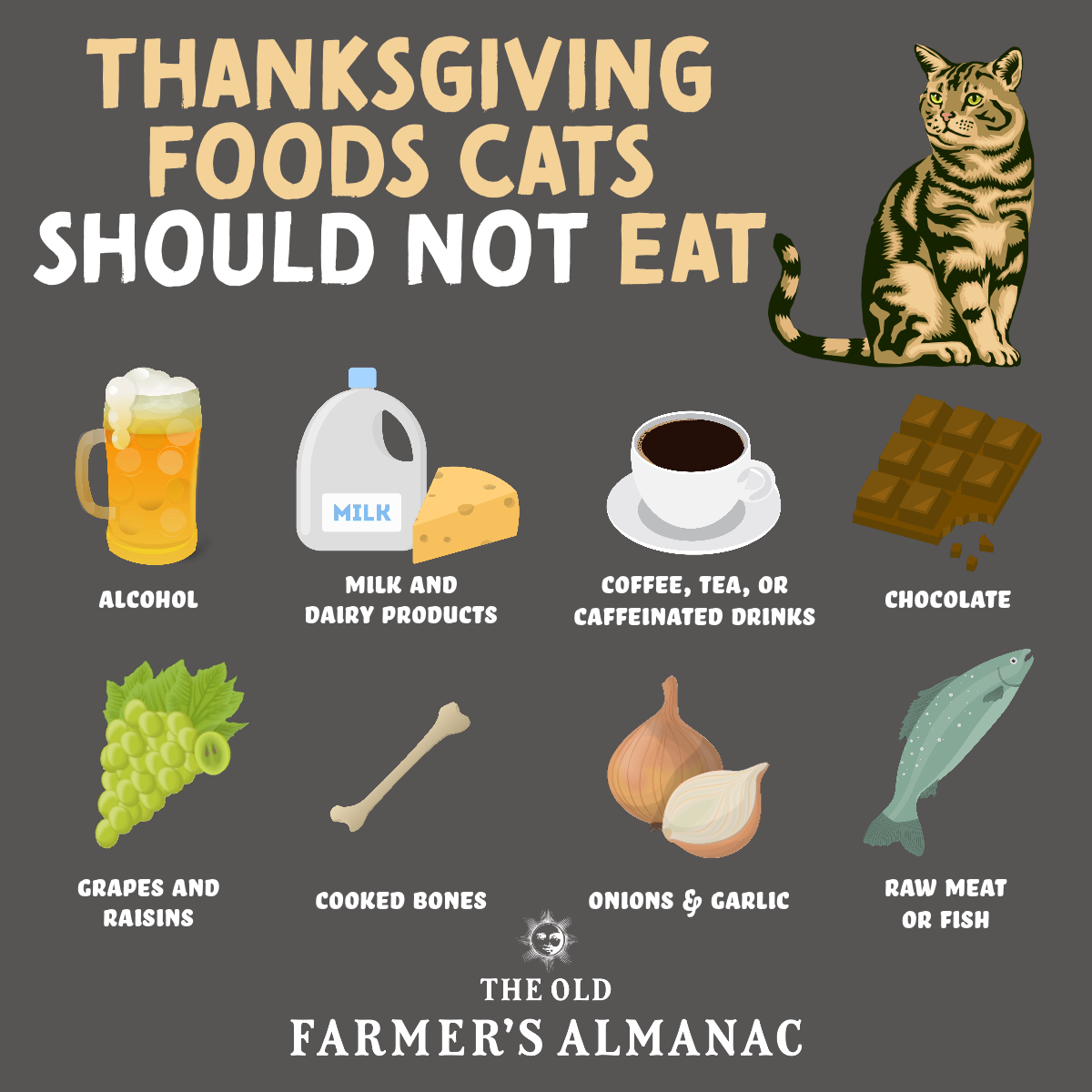Best and Worst Thanksgiving Foods for Cats
Which Thanksgiving Foods Are Safe for Kitties?
For daily wit & wisdom, sign up for the Almanac newsletter.
Body
This Thanksgiving, as you’re preparing the family feast, don’t forget about your favorite feline friends. There are several foods enjoyed by humans that are also safe for cats, but there are many others that should be kept far away.
Safe Thanksgiving Foods for Cats
Cats respond best to natural foods, cooked for better digestion. These include…
- Apples: Apples are a great source of vitamins C and K and other healthful nutrients. Cut apples into slices or small cubes, and avoid giving your cat the seeds or stem.
- Bananas: In some parts of the country, fruit salad is a popular Thanksgiving dish. No fruit salad is complete without bananas, which are also a safe and healthy snack for cats!
- Bread: It’s fine for felines, but limit to plain white or wheat varieties without nuts, seeds, or raisins. In fact, limit feeding bread to a once-in-a-while treat, as it offers no nutritional benefit and eating too much causes weight gain. Also, never feed your cat raw yeasted dough, which can cause ethanol (alcohol) poisoning.
- Broccoli: Steamed or boiled unseasoned broccoli is full of antioxidants and one of the best vegetables that you can feed your cat.
- Pumpkin and squash: Generally, when cooked, these quintessential fall gourds are great for your cat. Add purée of any unseasoned squash to dry or wet food. Always avoid giving your cat sugary, pre-seasoned, canned pumpkin pie mix. Learn how to make homemade pumpkin puree.
- Turkey and chicken: Cats are meat-eaters, so lean meats like turkey and chicken can be great protein sources for them. As with anything else coming off the table, feed these in moderation and be sure to avoid any skin, extra fats, or seasonings.

NEVER Feed to Felines
While there are plenty of foods that are perfectly safe for Kitty, some should always be avoided, including:
- Alcohol: Alcohol and animals don’t mix. Depending on the size of the cat, even small amounts can result in alcohol toxicity with symptoms that can include drooling, lethargy, weakness, and collapse. If you know that your cat has ingested anything with alcohol (even mouthwash!) or is showing any signs of alcohol toxicity, contact a vet immediately.
- Chocolate: You’ve probably heard this before, but it bears repeating—Do not feed your cat chocolate. It’s highly toxic (especially the darker varieties) and can cause nausea, diarrhea, abnormal heart rate, seizures, and muscle tremors, among other symptoms. In rare cases, death can occur.
- Coffee and tea: You might live for your morning cup of coffee, but cats are much more sensitive to caffeine’s effects. While a little slurp of coffee or tea likely won’t cause any issues, contact the vet if larger amounts, grounds, beans, or tea bags are consumed.
- Cooked bones: You should think twice before slipping your cat a cooked chicken or turkey bone straight from the table. Cooked bones can splinter and, if swallowed, can become lodged in your cat’s throat or cause tears in the esophagus.
- Grapes and raisins: Highly toxic to cats, grapes and their dehydrated cousins can cause gastrointestinal distress, vomiting, and kidney failure.
- Milk and dairy products: People often think of milk and cats going together like peanut butter and jelly, but this is simply not the case. While some cats have no problem in digesting dairy, many others are intolerant to lactose, which can cause a host of stomach issues. It’s best to keep the milk and cheese away.
- Onions and garlic: Depending on the amount consumed, onions, garlic, and all members of the Allium family can cause symptoms ranging from mild stomach upset to anemia.
- Raw meat and fish: Unless you’ve discussed options for a safe, raw diet for your pet with its vet, always cook meat or fish before serving it to your feline friend. Raw meat or fish can transmit foodborne pathogens that can make your cat sick.

Unless you have been specifically instructed otherwise by a veterinarian, you should make sure that the core of your cat’s diet is food specially made for felines. This doesn’t mean, though, that there isn’t room for the occasional treat—and what better time for a little food-related love than on Thanksgiving?
Now, see the foods that dogs can and can’t eat!
About The Author
Ginger Vaughan
Ginger is the Owner and President of Vaughan Communication, where she works with a variety of clients, managing and coordinating PR campaigns and events.
Read More from Ginger Vaughan











